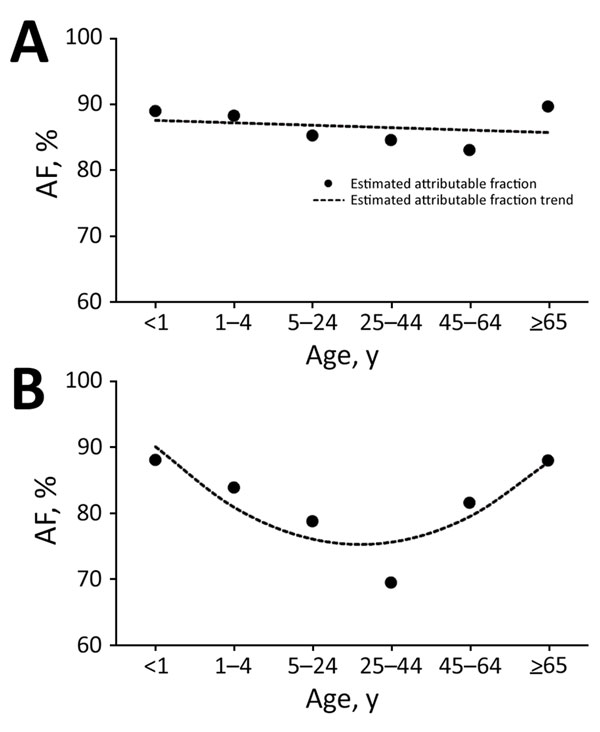Attributable Fraction of Influenza Virus Detection to Mild and Severe Respiratory Illnesses in HIV-Infected and HIV-Uninfected Patients, South Africa, 2012–2016
Stefano Tempia

, Sibongile Walaza, Jocelyn Moyes, Adam L. Cohen, Claire von Mollendorf, Meredith L. McMorrow, Florette K. Treurnicht, Marietjie Venter, Marthi Pretorius, Orienka Hellferscee, Nicole Wolter, Anne von Gottberg, Athermon Nguweneza, Johanna M. McAnerney, Halima Dawood, Ebrahim Variava, Shabir A. Madhi, and Cheryl Cohen

Author affiliations: National Health Laboratory Service, Johannesburg, South Africa (S. Tempia, S. Walaza, J. Moyes, C. von Mollendorf, F.K. Treurnicht, M. Pretorius, O. Hellferscee, N. Wolter, A. von Gottberg, A. Nguweneza, J.M. McAnerney, S.A. Madhi, C. Cohen); US Centers for Disease Control and Prevention, Atlanta, Georgia, USA (S. Tempia, A.L. Cohen, M.L. McMorrow); US Centers for Disease Control and Prevention, Pretoria, South Africa (S. Tempia, A.L. Cohen, M.L. McMorrow); University of the Witwatersrand, Johannesburg (S. Walaza, J. Moyes, C. von Mollendorf, O. Hellferscee, N. Wolter, A. von Gottberg, E. Variava, S.A. Madhi, C. Cohen); World Health Organization, Geneva, Switzerland (A.L. Cohen); University of Pretoria, Pretoria (M. Venter, M. Pretorius); Pietermaritzburg Metropolitan Hospital, Pietermaritzburg, South Africa (H. Dawood); University of KwaZulu-Natal, Pietermaritzburg (H. Dawood); Klerksdorp-Tshepong Hospital Complex, Klerksdorp, South Africa (E. Variava)
Main Article
Figure 3

Figure 3. Estimated influenza virus attributable fraction (AF) and AF trends across age groups among inpatients with severe chronic respiratory illness, Klerksdorp and Pietermaritzburg, South Africa, May 2012–April 2016. A) HIV-infected patients (AF trends estimated using model 1, a linear model). B) HIV-uninfected patients (AF trends estimated using model 2, a quadratic model).
Main Article
Page created: June 19, 2017
Page updated: June 19, 2017
Page reviewed: June 19, 2017
The conclusions, findings, and opinions expressed by authors contributing to this journal do not necessarily reflect the official position of the U.S. Department of Health and Human Services, the Public Health Service, the Centers for Disease Control and Prevention, or the authors' affiliated institutions. Use of trade names is for identification only and does not imply endorsement by any of the groups named above.
